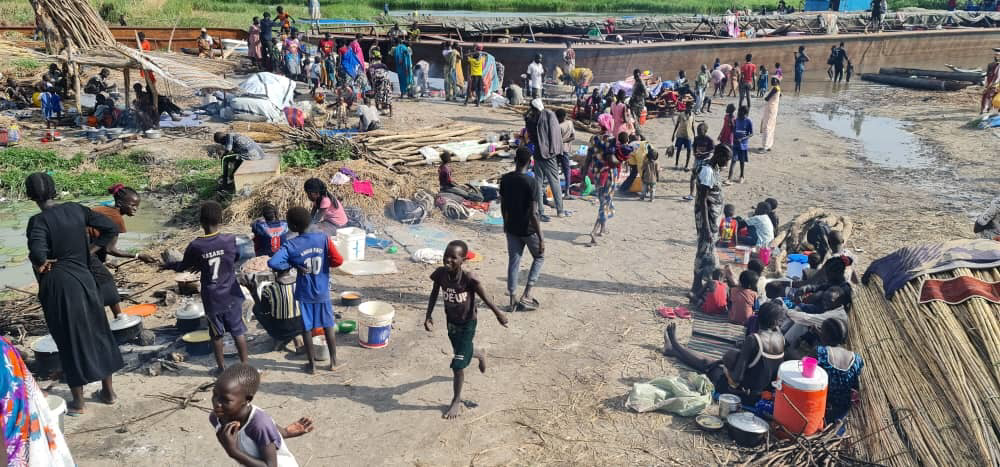Sudan is experiencing one of most severe, yet forgotten humanitarian crises today. Nearly 18 million people (almost one in three), are grappling with acute food insecurity, due to the armed conflict which is approaching the one-year mark, organised violence, and economic decline.
According to Integrated Food Security Phase Classification (IPC), the UN-led hunger monitoring system, 4.9 million people (10 per cent) of Sudan’s population is in “emergency” conditions defined by very high acute malnutrition and excess mortality, while 12.8 million people (27 per cent), are in “crisis” conditions.
If unfettered humanitarian access is not provided, these 12.8 million people could soon be pushed into “emergency” levels of hunger. Acute malnutrition rates in children under five have also been increasing since the beginning of the conflict.
“There’s a critical need for increased humanitarian aid to help those who are hungry and displaced, but getting it to them is becoming more and more difficult due to rising violence. On top of that, fuel shortages, higher prices and communication’s breaks are making it even tougher to organise and streamline the response,” said Samuel Devaux, Action Against Hunger’s Operations Desk Officer for Sudan.
“A guarantee of safe access for aid workers is urgently needed, so they can get help to those in need quickly and efficiently, avoiding millions of Sudanese to fall into famine in the upcoming months,” Devaux continued.
The conflict has fuelled the world’s largest displacement crisis of 11 million people, including 3 million children. Children have been bearing the brunt of the conflict, with 14 million requiring urgent humanitarian assistance.
The conflict’s initial epicentre was the capital of Khartoum, with the majority of displaced people fleeing from the fighting there. Displacement and violence have restricted access to vital resources including food, access to health services and essential relief items.
Economic and agricultural activity has collapsed due to the destruction of land and spiralling costs of agricultural items, the blocking of transport systems, and damage to water supplies, all of which are contributing to deteriorating levels of food security in Sudan.
THE CONFLICT IN SUDAN IS ALSO A GENDER CONFLICT
In November 2023, UN experts expressed alarm at the escalation of sexual violence committed during the conflict. There have been reports of women and girls being raped and abducted, some of them forcibly married and held for ransom. Several sources have reported seeing women and girls chained in vans inside cars in inhumane conditions.
Action Against Hunger considers a protection and gender response in conflict contexts to be crucial, especially in the case of Sudan, where reports are extremely worrying.
Action Against Hunger’s team in Sudan is assisting survivors of gender-based violence through a mobile hotline. The organisation’s health experts are setting up women’s centres and community protection networks, both to respond to immediate needs and pave the way for long-term support.
Action Against Hunger teams also conduct awareness-raising sessions, train local health workers and community leaders on gender equality, set up school clubs to raise awareness of gender-based violence, and advocate for inclusive and equitable communities.
AN UNDER-FUNDED AND UNDER-ACCESSED HUMANITARIAN RESPONSE
It is more urgent than ever before for humanitarian workers to have guaranteed safe access Sudan’s impacted communities. The intensification of hostilities is hampering the delivery of humanitarian aid, due to large-scale insecurity and movement restrictions. Fuel shortages and rising prices also impact transport costs. The international community faces significant obstacles to respond effectively and requires coordinated efforts to address the challenges and provide lifesaving assistance to Sudan.
Action Against Hunger is also calling on the international community to quickly mobilise the necessary resources to save lives and protect affected communities. According to the UN, the funding needed to respond with humanitarian aid in Sudan is £2.1 billion, of which £74.8 million has been received. This equates to an advance of 4% of the total funding required.
Although the funds received in 2023 were not sufficient to respond to needs, the humanitarian community did endeavour to address urgent priorities, providing humanitarian assistance to 7 million people. Action Against Hunger reached nearly 500,000 people between April and December 2023 with our humanitarian response in health, nutrition, livelihoods, water, sanitation, hygiene, gender and protection.
Our teams continue to work despite persistent conflict-related challenges. Today we are present in 11 locations in White Nile, Blue Nile, South Kordofan and Central Darfur states, all of which are experiencing “crisis” levels of food insecurity.


